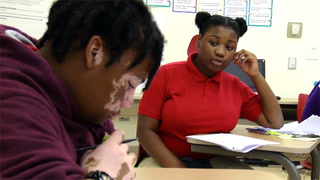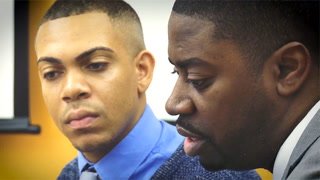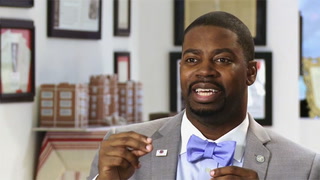Building Coaching Relationships Transcript
Speaker 1: Continue to tie them back to some of the things they talked about in that assessment.
Speaker 2: Okay, thank you.
Speaker 1: You will now have 30 seconds to confer with the person with left or right of you.
Speaker 2: So relationship building is extremely important. James Comer said that there's no significant learning without a significant relationship. Even in looking at teaching and learning with children, it's the same thing with adults.
Speaker 1: Please highlight that.
Speaker 2: You don't necessarily have to be their best friend, but they have to know that you care for them beyond what you can do for them. So building relationships is really key. Like, how do I do something for you if I don't think there's an investment in there?
Speaker 1: All right here we go. Relationship building works both ways. I had to take strategic steps to also get to know about Mr. Parker and how he works so that we can adjust to each other. It definitely works both ways, just like any other relationship. Both parties have to be invested in developing their relationship so that we get the results that we're aiming for.
Speaker 2: What are you thinking about?
Speaker 1: The first thing I would like to do is to just circulate the room to gather some data.
I definitely went through the stage where I felt like, "Eh, trying to figure this out on my own". If I had any advice for teachers who felt that way, I would just encourage them to be reflective and always think with the end goal in mind. That's what I do. I think the reason why I come here every day is for the students. If what I'm doing is not working or there's something that I'm doing well but it could be taken to the next level and I don't know how to do that right now and there's someone else who can help me get there, then I have to be reflective enough to allow that to happen for the benefit of my students.
Speaker 2: Good. I like the silence then that. The think, pair, share.
Speaker 1: Right, right.
Speaker 2: The teachers that are in my department see me all the time. I'm always giving advice when I come in, just seeing how they're doing, how I can support. Little check-ins make sense. I think those are things that can build a professional relationship that honors boundaries but also respects humanity, which I think is is the balance.
Talk to me about what resonated with you and how ...
Speaker 1: He really genuinely wants to know how are you doing, what are you afraid of, what are you confident about. He'll sit there and will take notes.
I found out what I've told him is infusing that coaching because he cares enough.
Speaker 2: Remember, I only care about you during the week because ...
Speaker 1: After that ...
Speaker 2: Weekends, nope.
Speaker 1: Mr. Copeland, who? Who's this?
Speaker 2: No, no. I'm just kidding, I'm just kidding.
I like that you did contrast the images with the written text. They said the written text was easy, but I think what they were forgetting was that you read half of it.
Speaker 1: Yes.
In the spirit of talking about relationship building, there has to be some sort of common ground. There has to be some way that we can connect deeper than what the content is. I think about, and Mr. Parker and I have talked about this, building a relationship with the students. We have nothing in common, what kind of relationship are we going to have? It won't be a very sturdy one.
You have to find that common ground, find our where we can connect at, and then from that, building a very positive coaching and teaching relationship as well.
Speaker 2: I like how you modeled the juxtapositions. I'll look for that and I'll also check with you, so just let me know when you're ready.
Speaker 1: All right, thank you.
Speaker 2: Mr. Copeland is very coachable. He will take feedback. He has his own ideas about what works, too, in possibly explicit or implicit terms. He has his own ideas about coaching, but he will take feedback and he will implement it. If it doesn't work well, he'll make an adjustment. I very much enjoy that, on most days.
Speaker 1: [laughter] Except weekends.
Speaker 2: So, favorite quirks. First, he talks very fast.
Speaker 1: I was say quirks of Mr. Parker is he always has his mouse.
Speaker 2: Oh, that's right. With my computer, don't judge me.
Speaker 1: If he is not seen with that mouse, we think something's wrong.
Speaker 2: He also is very serious about his food.
Speaker 1: He is going to have a board, a whiteboard, to write on, otherwise there is no coaching that is going to take place. So we find a whiteboard for Mr. Parker.
Speaker 2: One of them had a nice little inappropriate comment earlier.
Speaker 1: Listen, listen, it was one word. It could've been worse.
Speaker 2: Oh, it could've been a lot worse.
Speaker 1: It's not going to make it to post.
Speaker 2: I guess I would say a word for coaches who are having trouble, make sure you keep working on the relationship. Don't give up on it because the relationship is the mortar that you can build the bricks of construction on.













24 Comments
Michael Burnett Jun 13, 2020 10:42am
"There is no significant learning without significant relationships." This is true between teacher and student, but also between the teacher and Mr. Parker. If Mr. Colquitt was not involved in the relationship he would not be as open to critique and new ideas.
Both parties have to be invested to build the relationship. This involves a level of trust between the two. There is a good amount of give and take on both parts, and an openness to being corrected and asking questions about how to be better. There is a good level of respect between the two.
His advice is to be reflective and to think about having the end goal of helping students in mind.
Kelly Eldred Jun 29, 2019 10:16am
This provides really great advice for coaches who are just getting started. Relationships are so important, and building trust is key. Teachers are much more likely to accept feedback and actually use it when these foundation pieces are in place.
Eunice Cheung Apr 15, 2018 1:20am
Diane Young Mar 5, 2018 8:47pm